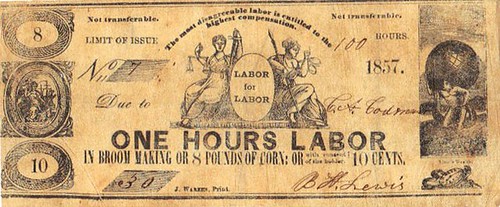
PREV ARTICLE
NEXT ARTICLE
FULL ISSUE
PREV FULL ISSUE
EURO CRISIS REVIVES TIME BANKS AND LABOR EXCHANGE NOTES
An article in The Washington Post this week discusses a European revival of the time bank, an alternative payment system allowing the unemployed, underemployed, and anyone else the ability to swap their labor for products and services provided by others.
-Editor
But Corcoles didn’t mind. Through a citywide credit network that allows people to trade services without money, the 10 hours Corcoles earned could be used to pay for a haircut, yoga classes or even carpentry work. At a time when the future of the euro is in doubt and millions are unemployed or underemployed with little cash to spare, a parallel economy is springing up in parts of Spain, allowing people to live outside the single currency. In the city of Malaga, on the country’s southern Mediterranean coast just 80 miles from Africa, residents have set up an online site that allows them to earn money and buy products using a virtual currency. The Catalonian fishing town of Vilanova i la Geltru has launched a similar experiment but with a paper credit card of sorts. It implements a new currency worth slightly more than the euro when it is used at local stores. In Barcelona, the country’s second-largest city after Madrid, the preferred model is time banks, which allow people to trade their services in hours without the involvement of money. “This is a way for people who are on the fringes of the economy to participate again,” said Josefina Altes, coordinator of the Spanish Time Bank Network. Similar projects are popping up in Greece, Portugal and other euro-zone countries with troubled economies. While each social-money project has its own accounting rules, the basic concept is the same. You earn credits by providing services or selling goods, and you can redeem the credits with people or businesses in the network. Many of the time banks operate like real banks — with individual accounts, ledgers, checkbooks and, in many cases, even auditors. Some conduct transactions with physical checks and are overseen by a secretary who keeps track of deposits. Others exist solely on the Internet.
To read the complete article, see:
In Spain, financial crisis feeds expansion of a parallel, euro-free economy
(www.washingtonpost.com/business/economy/in-spain-financial
I have a few labor exchange notes issued by Robert Owen in London, probably the earliest such scheme. I don't have images of them handy, but below is an image from the British Museum site followed by images of some other labor exchange notes from the Internet and earlier E-Sylum articles.
-Editor

Robert Owen Labor Exchange Note, Great Britain, 1833
To read the complete article, see:
Equitable Labour Exchange note worth 10 hours work
(www.britishmuseum.org/explore/highlights/highlight_objects/cm/e/

Josiah Warren Labor Note, Long Island, New York, 1857 To read the earlier E-Sylum article, see: LABOR EXCHANGE NOTE INFORMATION SOUGHT (www.coinbooks.org/esylum_v14n51a08.html)

Labor Exchange Note, Akron, Ohio 1897 To read the complete article, see: Akron, Ohio 1897 Labor Exchange Note 5/100 (www.currencyquest.com/item.php?item_id=1571&category_id=209)
If the Internet had been around in 1833 you can bet your bottom dollar Robert Owen would have made use of it like his modern counterparts have. But I'll bet most of the users of these currencies think it's a new idea and would be surprised to learn the concept is nearly two centuries old. These notes are important components of world financial history. So here's where I'll insert my regular plea to readers that NOW is the time to be recording and collecting the modern pieces. Does anyone have examples of these in their collection? Are European museums collecting them?
-Editor
Wayne Homren, Editor The Numismatic Bibliomania Society is a non-profit organization promoting numismatic literature. See our web site at coinbooks.org. To submit items for publication in The E-Sylum, write to the Editor at this address: whomren@gmail.com To subscribe go to: https://my.binhost.com/lists/listinfo/esylum All Rights Reserved. NBS Home Page Contact the NBS webmaster 
|
